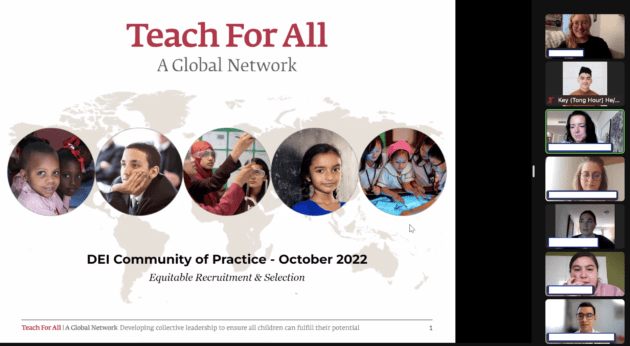At Teach For Cambodia, we are exploring what Diversity, Equity, and Inclusion means to us, why it is important in our work, and contributing to the global conversation on how DEI conversations and actions can manifest differently in different contexts.
Recently, TFC’s Learning and Design Manager, Tong Hour Ou, was invited to join Teach For All’s Diversity, Equity & Inclusion (DEI) Community of Practice. This is one of many professional development programs available to staff members of Teach For All partner organizations, such as Teach For Cambodia. The six-month program brings together participants from all over the world, with diverse cultural backgrounds and experiences, who have a strong interest in implementing DEI practices in their work and life.

Before joining TFC, Tong Hour was already a DEI advocate but the program is giving him access to more tools and support to reflect and put his values into action. When asked why DEI is important to his role, Tong Hour shared, “Our work at TFC is centered on equity. We work in low-resource communities and our Fellows come from different backgrounds. Many have experienced inequities in their schools and communities and share similar backgrounds to the students that they teach. As a member of the team that trains and supports them, we need to be informed about this reality. This affects how different people learn, and the more aware we are about their backgrounds and experiences, we can approach our work from an inclusive lens and reach people where they are at.”
Back in April, TFC’s CEO Moni Siv participated as a panelist on a DEI Advocate Series Discussion with speakers from Pakistan, Germany, and Bolivia. He shared his belief that DEI starts from within; in order for us to seek equity externally, we need to practice equity within ourselves. This means seeing and accepting the diverse parts of our own identity and experiences as a first step. In working with others, deep listening can unlock empathy and acceptance which we believe are fundamental to DEI work. We found this to be true with students as well.
In TFC’s Financial Education Initiative, we adapted the Aflateen+ curriculum because of its emphasis on life skills and financial education through a gender lens. This means that girls and boys had the opportunity to open up, share and understand one another’s unique hopes, fears, challenges and goals. This led to greater empathy in the classroom and created a sense of community that contributed to the positive learning outcomes of the program.
Last question: How can we make DEI a priority in our organizations? Panelists in the DEI Advocate Series suggested it be integrated as a key performance indicator. Achieving educational equity is a long game, but we believe small steps forward together can make a difference.